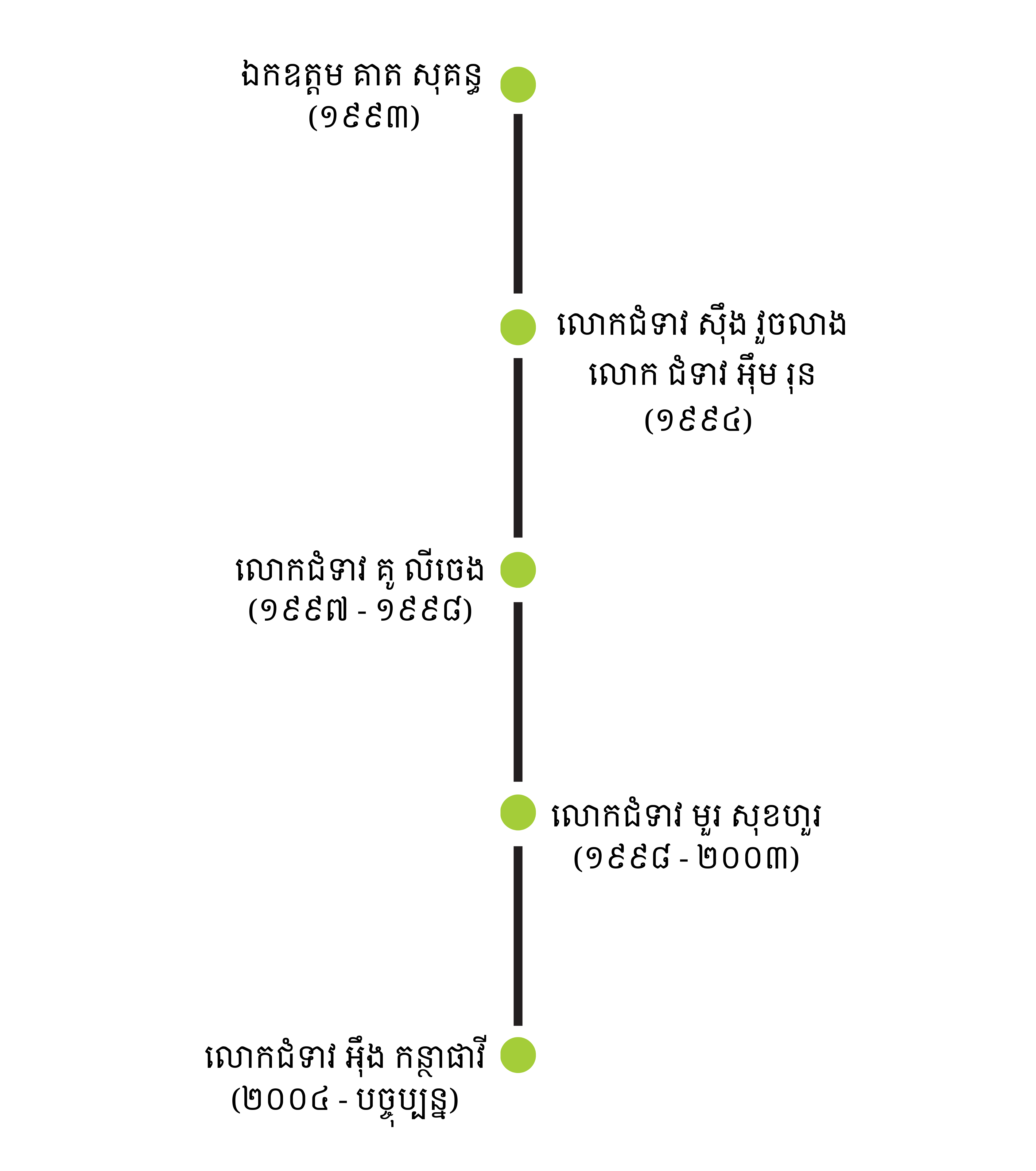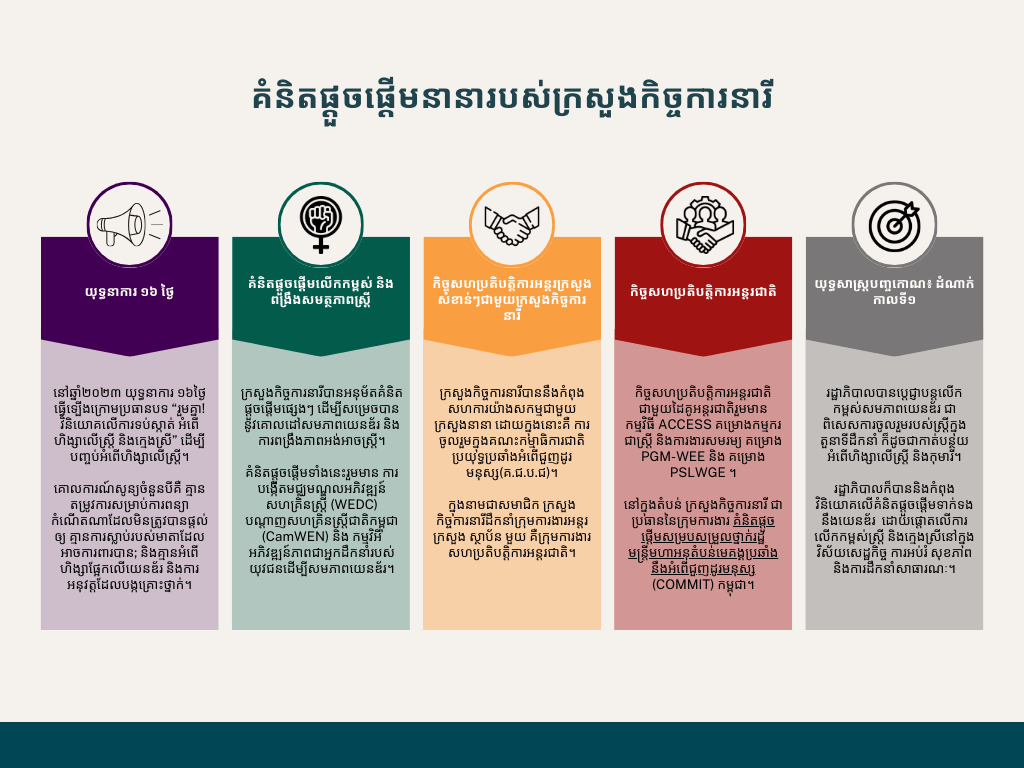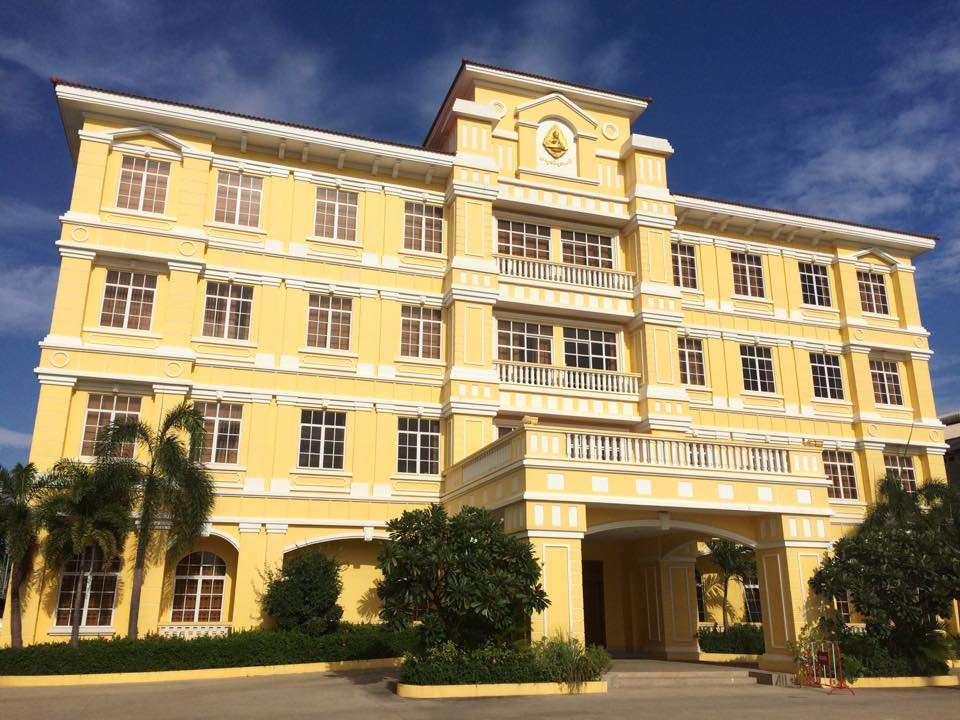ការបង្កើតទ្បើង
យោងតាម ព្រះរាជក្រឹត្យលេខ នស/រកម/០១៩៩/២២ ក្រសួងកិច្ចការនារីត្រូវបានបង្កើតឡើងជាផ្លូវការនៅថ្ងៃទី២៤ ខែមករា ឆ្នាំ១៩៩៦។ ក៏ប៉ុន្តែ ក្រសួងកិច្ចការនារីបានក្លាយជាក្រសួងកិច្ចការនារី និងអតីតយុទ្ធជន យ៉ោងតាម ព្រះរាជក្រឹត្យលេខ នស/រកម/០៩៩៩/១០ ចុះថ្ងៃទី១៨ ខែកញ្ញា ឆ្នាំ១៩៩៩។ រហូតមកដល់ឆ្នាំ ២០០៥ ទើបក្រសួងបានក្លាយជាក្រសួងកិច្ចការនារីម្តងទៀត យ៉ោងតាម ព្រះរាជក្រឹត្យលេខ នស/រកម/០១០៥/០០២ ដែលបានចុះនៅថ្ងៃទី១៧ ខែមករា ឆ្នាំ២០០៥។
ក្នុងនាមជាយន្តការជាតិក្នុងការផ្សព្វផ្សាយ និងលើកកម្ពស់ស្ត្រី ក្រសួងកិច្ចការនារីដឹកនាំ និងសម្របសម្រួលកិច្ចខិតខំប្រឹងប្រែងឆ្ពោះទៅរកសមភាពយេនឌ័រ និងការលើកកម្ពស់ស្ត្រីនៅកម្ពុជា។ ក្រសួងកិច្ចការនារីដើរតួនាទីជាអ្នកជំរុញ និងជាអ្នកតស៊ូមតិក្នុងការរួមបញ្ចូលគោលនយោបាយ និងកម្មវិធីសមធម៌យេនឌ័រនៅគ្រប់វិស័យ រួមទាំងស្ថាប័នសាធារណៈ អង្គការសង្គមស៊ីវិល និងវិស័យឯកជន។ ក្រសួងកិច្ចការនារីក៏ទទួលបន្ទុកផងដែរក្នុងការត្រួតពិនិត្យ និងវាយតម្លៃគោលនយោបាយ និងកម្មវិធីរបស់រដ្ឋាភិបាល ក្នុងគោលបំណងធ្វើឱ្យប្រសើរឡើងនូវសមភាពយេនឌ័រ។1
បេសកកម្មចម្បងរបស់ក្រសួងកិច្ចការនារីគឺកាត់បន្ថយគម្លាតយេនឌ័រ និងបង្កើនលទ្ធភាពទទួលបានធនធានផលិតភាពដល់ស្ត្រីគ្រប់រូប។ សកម្មភាពសំខាន់ៗចំនួនប្រាំរបស់ក្រសួងកិច្ចការនារីរួមមាន
- បញ្ជ្រាបយេនឌ័រនៅក្នុងច្បាប់ កំណែទម្រង់រដ្ឋាភិបាល និងគោលនយោបាយជាតិ និងវិស័យផ្សេងៗ
- សម្របសម្រួល និងតាមដានកម្មវិធីសមភាពយេនឌ័រ និងការអនុវត្តគោលនយោបាយ
- អនុវត្តវិធានការដើម្បីលុបបំបាត់ឧបសគ្គ ការរើសអើង និងទម្រង់យេនឌ័រ ដែលរារាំងដល់ការចូលរួមជាសាធារណៈរបស់ស្ត្រី
- អនុវត្តគំនិតផ្តួចផ្តើមដើម្បីលើកទឹកចិត្តបុរស និងក្មេងប្រុសឱ្យគាំទ្រសមភាពយេនឌ័រ និងចូលរួមក្នុងការងារផ្ទះ និងការថែទាំកុមារ
- កំណត់តម្រូវការរបស់ស្ត្រី និងកុមារីដែលងាយរងគ្រោះ។2
តាំងពីឆ្នាំ២០២៣មក ក្រសួងកិច្ចការនារីស្ថិតនៅក្រោមការដឹកនាំរបស់លោកជំទាវបណ្ឌិត អ៊ឹង កន្ថាផាវី ជារដ្ឋមន្ត្រីក្រសួងកិច្ចការនារីតាំងពីឆ្នាំ២០០៤។ បន្ថែមពីលើតំណែងរបស់លោកជំទាវជារដ្ឋមន្ត្រី លោកជំទាវបណ្ឌិត អ៊ឹង កន្ថាផាវី ក៏ជាប្រធានគណៈកម្មាធិការជាតិលើកកម្ពស់សីលធម៌សង្គម តម្លៃស្ត្រី និងគ្រួសារខ្មែរ (NCSWF) តាំងពីឆ្នាំ២០០៦។ នៅក្នុងឆ្នាំ ២០១៤ លោកជំទាវបណ្ឌិត ស្ថិតក្នុងចំណោមមេដឹកនាំស្ត្រីទាំងប្រាំបួនដែលទទួលបានពានរង្វាន់ “ស្ត្រីឆ្នើមបំផុត” ពីវេទិកាសហប្រតិបត្តិការសេដ្ឋកិច្ចអាស៊ីប៉ាស៊ីហ្វិក (APEC)។3 សព្វថ្ងៃ លោកជំទាវក៏មានតួនាទីជាអនុប្រធានគណៈកម្មាធិការជាតិប្រឆាំងការជួញដូរមនុស្ស (NCCT) និងជាប្រធានក្រុមការងារបច្ចេកទេសស្តីពីកិច្ចសហប្រតិបត្តិការអន្តរជាតិផងដែរ។4
រចនាសម្ព័ន្ធអង្គការ
ក្រាបខាងក្រោមបង្ហាញពីរចនាសម្ព័ន្ធអង្គការរបស់ក្រសួងកិច្ចការនារី ដោយបង្ហាញពីនាយកដ្ឋាន និងអនុនាយកដ្ឋានទាំងអស់នៅក្នុងក្រសួង។
រដ្ឋមន្ត្រីក្រសួងការបរទេសតាំងពីឆ្នាំ១៩៩៣
តារាងពេលវេលាខាងក្រោមបង្ហាញពីបញ្ជីឈ្មោះបុគ្គលដែលធ្លាប់បានបម្រើការជារដ្ឋមន្ត្រីក្រសួងកិច្ចការនារីតាំងពីឆ្នាំ ១៩៩៣។5

តារាងពេលវេលាបង្ហាញពីអាណត្តិរដ្ឋមន្ត្រីក្រសួងកិច្ចការនារី តាំងពីឆ្នាំ១៩៩៣ រៀបចំដោយក្រុមការងារអូឌីស៊ី។
មន្ទីរកិច្ចការនារីខេត្ត (PDoWA)
សព្វថ្ងៃនេះ មានមន្ទីរកិច្ចការនារីខេត្តប្រមាណ ២៥ (PDoWA) នៅទូទាំងខេត្ត និងក្រុងក្នុងប្រទេសកម្ពុជា។6 បន្ថែមពីនេះ មជ្ឈមណ្ឌលអភិវឌ្ឍន៍ស្ត្រី (WDCs) មានប្រហែល ១៨ ទីតាំងនៅក្នុងខេត្តចំនួន ១៤។ មជ្ឈមណ្ឌលថ្នាក់ក្រោមជាតិទាំងនេះ ដំណើរការក្រោមក្រសួង និងមន្ទីរខេត្តរបស់ខ្លួន ដើម្បីផ្តល់ការបណ្តុះបណ្តាលវិជ្ជាជីវៈដល់ស្ត្រី ពង្រឹងជំនាញ និងបង្កើនឱកាសការងារ។ វគ្គបណ្តុះបណ្តាលទាំងនេះគ្របដណ្តប់លើជំនាញផ្សេងៗដូចជា តម្បាញ ផលិតសិប្បកម្ម កាត់សក់ កាត់ដេរ និងកែច្នៃអាហារ។7
យោងតាមរបាយការណ៍របស់អង្គការសហប្រជាជាតិ តាមរយៈមន្ទីរ និងមណ្ឌលខេត្តទាំងនេះ ក្រសួងបានផ្តល់ការបណ្តុះបណ្តាលវិជ្ជាជីវៈដល់ស្ត្រីប្រមាណ ៣៧៤០ នាក់ក្នុងមួយឆ្នាំ ចន្លោះឆ្នាំ ២០១៨-២០២០។ ក្រសួងក៏បានរៀបចំក្រុមផលិតកម្ម និងសន្សំប្រមាណ ២១១ ក្រុម ដែលមានប្រមាណ ៥,០៨០ គ្រួសារ នៅក្នុងវិស័យឧស្សាហកម្មមិនមែនកសិកម្មផ្សេងៗ ដូចជា សិប្បកម្ម ផលិតកម្មបសុបក្សី និងផលិតកម្មម្ហូបអាហារជាដើម។ សកម្មភាពទាំងនេះធ្វើឡើងក្នុងខេត្តចំនួន ៥ រួមមានខេត្តព្រៃវែង ស្វាយរៀង តាកែវ កំពត និងកណ្តាល។8
ផែនការនារីរតនៈ
នារីរតនៈ គឺជាផែនការយុទ្ធសាស្ត្រជាតិរយៈពេលប្រាំឆ្នាំសម្រាប់សមភាពយេនឌ័រ និងបង្កើនភាពអង់អាចដល់ស្ត្រី ដែលបង្កើតឡើងដោយក្រសួងកិច្ចការនារី និងអតីតយុទ្ធជនក្នុងឆ្នាំ១៩៩៩។ ចក្ខុវិស័យរបស់នារីរតនៈគឺ “ប្រជាពលរដ្ឋកម្ពុជាទាំងអស់ទទួលបានសិទ្ធិស្មើៗគ្នាតាមច្បាប់ ជាពិសេសស្ត្រី និងកុមារី មានសុវត្ថិភាពផ្ទាល់ខ្លួន ចូលរួមយ៉ាងពេញលេញក្នុងជីវិតសាធារណៈ ការងារ អាចធ្វើការសម្រេចចិត្តនៅគ្រប់កម្រិត និងគ្រប់វិស័យដោយស្មើភាពគ្នាជាមួយបុរស និងក្មេងប្រុស ដើម្បីធានាភាពជាម្ចាស់ផ្ទាល់ខ្លួន និងភាពសុខដុមរមនាក្នុងគ្រួសារ សហគមន៍ និងសង្គម។”9 ផែនការនេះកំពុងស្ថិតក្នុងដំណាក់កាលទី៥ គឺនារីរតនៈទី៥ (២០១៩-២០២៣) ដោយកំពុងអនុវត្តក្រោមក្រសួងកិច្ចការនារី។ ដូចនឹងផែនការនារីរតនៈមុនៗដែរ នារីរតនៈទី៥ លើកកម្ពស់ការបញ្ជ្រាបយេនឌ័រនៅក្នុងគោលនយោបាយ ផែនការយុទ្ធសាស្ត្រ និងកម្មវិធីអភិវឌ្ឍន៍នៅគ្រប់វិស័យ និងគ្រប់កម្រិត ជាពិសេសផ្នែកសេដ្ឋកិច្ច ការអប់រំ សុខភាព ការការពារផ្លូវច្បាប់ អភិបាលកិច្ច និងការប្រែប្រួលអាកាសធាតុ។ ដើម្បីសម្រេចបាននូវគោលដៅក្នុងការពង្រឹងការបញ្ជ្រាបយេនឌ័រ ផែនការនេះមានយុទ្ធសាស្ត្រតាមវិស័យចំនួនប្រាំមួយរួមមាន៖
- ការពង្រឹងសេដ្ឋកិច្ចរបស់ស្ត្រី
- ការអប់រំស្ត្រី និងកុមារី
- សុខភាពស្ត្រី និងក្មេងស្រី
- ការការពារផ្នែកច្បាប់សម្រាប់ស្ត្រី និងកុមារី
- ស្ត្រីក្នុងភាពជាអ្នកដឹកនាំសាធារណៈ និងនយោបាយ
- យេនឌ័រក្នុងបម្រែបម្រួលអាកាសធាតុ។10
នារីរតនៈទី៥ ក៏មានបង្ហាញនូវយុទ្ធសាស្ត្រគាំទ្រស្ថាប័នសម្រាប់ការអភិវឌ្ឍសមត្ថភាព និងប្រសិទ្ធភាព ដែលផ្តោតលើការពង្រឹងសមត្ថភាព និងកំណែទម្រង់រដ្ឋបាលសាធារណៈក្នុងក្រសួង ការបង្កើនប្រសិទ្ធភាពនៃការត្រួតពិនិត្យ និងវាយតម្លៃការអនុវត្តការងារ និងការពង្រីកការគ្រប់គ្រង និងការផ្សព្វផ្សាយព័ត៌មានសម្រាប់ការឆ្លើយតបយេនឌ័រ។ យុទ្ធសាស្ត្រនេះក៏ដំណើរការ ដើម្បីបង្កើនបរិយាប័ន្នស្ត្រី និងកុមារីពិការ ដែលជាផ្នែកមួយនៃក្រុមដែលជួបការលំបាក និងងាយរងគ្រោះ។11
នារីរតនៈ ទទួលបានការគាំទ្រពីប្រភពសំខាន់ៗចំនួនពីរ គឺថវិកាជាតិ និងកិច្ចសហប្រតិបត្តិការជាមួយអង្គការដៃគូនានា។ អង្គការដៃគូសំខាន់ៗមួយចំនួនរួមមាន កម្មវិធីអភិវឌ្ឍន៍របស់អង្គការសហប្រជាជាតិ (UNDP) អង្គការសហប្រជាជាតិស្ត្រី ទីភ្នាក់ងារសហប្រតិបត្តិការអន្តរជាតិជប៉ុន (JICA) អង្គការអេកហ្ស៊ិនអេដ និង អង្គការ Care Cambodia។12
គំនិតផ្តួចផ្តើមដោយក្រសួងកិច្ចការនារី

តារាងពេលវេលាបង្ហាញពីអាណត្តិរដ្ឋមន្ត្រីក្រសួងកិច្ចការនារី តាំងពីឆ្នាំ១៩៩៣ រៀបចំដោយក្រុមការងារអូឌីស៊ី។
យុទ្ធនាការ ១៦ ថ្ងៃ
នៅឆ្នាំ២០២៣ ក្រសួងកិច្ចការនារីបានចាប់ផ្តើមយុទ្ធនាការរយៈពេល១៦ថ្ងៃ ក្រោមប្រធានបទ “រួមគ្នា! វិនិយោគលើការទប់ស្កាត់ អំពើហិង្សាលើស្រី្ត និងក្មេងស្រី” ដើម្បីបញ្ចប់អំពើហិង្សាលើស្ត្រី។13 យុទ្ធនាការរយៈពេល១៦ថ្ងៃ គឺជាយុទ្ធនាការអន្តរជាតិប្រចាំឆ្នាំ ដែលផ្តើមទ្បើងដោយសកម្មជននៅក្នុងពិធីសម្ពោធវិទ្យាស្ថានភាពជាអ្នកដឹកនាំសកលរបស់ស្ត្រីក្នុងឆ្នាំ១៩៩១។ យុទ្ធនាការនេះត្រូវបានគេមើលឃើញថាជាយុទ្ធសាស្ត្ររៀបចំសម្រាប់បុគ្គល និងអង្គការនានាដើម្បីអំពាវនាវឱ្យមានការទប់ស្កាត់ និងលុបបំបាត់អំពើហិង្សាលើស្ត្រី និងកុមារី។ ជារៀងរាល់ឆ្នាំ យុទ្ធនាការនេះមានរយៈពេលសរុប១៦ថ្ងៃ ដោយចាប់ផ្តើមពីថ្ងៃទី២៥ ខែវិច្ឆិកា ដែលជាទិវាអន្តរជាតិសម្រាប់ការលុបបំបាត់អំពើហិង្សាលើស្ត្រី រហូតដល់ថ្ងៃទី១០ ខែធ្នូ ដែលជាទិវាសិទ្ធិមនុស្ស។14
យោងតាមលោកជំទាវបណ្ឌិត អ៊ឹង កន្ថាផាវី កម្ពុជាប្តេជ្ញាកាត់បន្ថយអំពើហិង្សាលើយេនឌ័រឱ្យនៅកម្រិតអប្បបរមាត្រឹមឆ្នាំ២០៣០ ដើម្បីសម្រេចបាននូវគោលការណ៍សូន្យចំនួនបីគឺ គ្មានតម្រូវការសម្រាប់ការពន្យាកំណើតណាដែលមិនត្រូវបានផ្តល់ឲ្យ គ្មានការស្លាប់របស់មាតាដែលអាចការពារបាន; និងគ្មានអំពើហិង្សាផ្អែកលើយេនឌ័រ និងការអនុវត្តដែលបង្កគ្រោះថ្នាក់។15
គំនិតផ្តួចផ្តើមលើកកម្ពស់ និងពង្រឹងសមត្ថភាពស្ត្រី
ក្រសួងកិច្ចការនារីបានអនុម័តគំនិតផ្តួចផ្តើមផ្សេងៗ ដើម្បីសម្រេចបាននូវគោលដៅសមភាពយេនឌ័រ និងការពង្រឹងភាពអង់អាចស្ត្រី។ នៅឆ្នាំ២០២០ ក្រសួងកិច្ចការនារីបានបង្កើតមជ្ឈមណ្ឌលអភិវឌ្ឍន៍សហគ្រិនស្ត្រី (WEDC) ក្នុងគោលបំណង
- ផ្តល់ការគាំទ្រការកសាងសមត្ថភាពដល់សហគ្រិនស្ត្រីនៅកម្ពុជា
- បង្កើនទីផ្សារសម្រាប់សហគ្រិនស្ត្រី
- បង្កើតវេទិកាគ្រប់គ្រងចំណេះដឹងជាប្រព័ន្ធសម្រាប់សហគ្រិនស្ត្រីនៅកម្ពុជា។16
ក្នុងឆ្នាំដដែលនេះ ក្រសួងកិច្ចការនារីក៏បានផ្តួចផ្តើមបង្កើតបណ្តាញសហគ្រិនស្ត្រីជាតិកម្ពុជាដំបូងគេ (CamWEN) ដើម្បីប្រមូលផ្តុំអ្នកតស៊ូមតិក្នុងភាពជាសហគ្រិនស្ត្រីដែលពាក់ព័ន្ធនៅក្នុងប្រទេសកម្ពុជា រួមទាំងសមាគមសហគ្រិនស្ត្រី សហព័ន្ធ និងអង្គការនានា។ គោលដៅនៃគំនិតផ្តួចផ្តើមនេះគឺដើម្បីប្រមូលសំឡេងរបស់សហគ្រិនស្ត្រី ហើយបញ្ចូលវាទៅក្នុងដំណើរការធ្វើការសម្រេចផ្សេងៗ។17
បន្ថែមពីលើការគាំទ្រដល់សហគ្រិនស្ត្រី ក្រសួងកិច្ចការនារីក៏ធ្វើការជាមួយយុវជនដោយបង្កើតកម្មវិធីយុវជនជាច្រើនដូចជា កម្មវិអីអភិវឌ្ឍន៍ភាពជាអ្នកដឹកនាំរបស់យុវជនដើម្បីសមភាពយេនឌ័រ។ កម្មវិធីនេះមានគោលបំណងលើកទឹកចិត្តយុវជនដែលកំពុងរៀនថ្នាក់ឧត្តមសិក្សា និងនៅគ្រឹះស្ថានរដ្ឋឱ្យចូលរួមក្នុងការលើកកម្ពស់សមភាពយេនឌ័រ និងការលុបបំបាត់ការរើសអើងលើស្ត្រី។ កម្មវិធីនេះរួមមានវគ្គបណ្តុះបណ្តាល ការឆ្លុះបញ្ចាំង ការចូលរួមវេទិកាសាធារណៈ ដំណើរទស្សនកិច្ចសិក្សា និងកម្មសិក្សានៅស្ថាប័នដៃគូ ក្នុងចំណោមកម្មវិធីផ្សេងៗទៀត។18
កិច្ចសហប្រតិបត្តិការអន្តរក្រសួងសំខាន់ៗជាមួយក្រសួងកិច្ចការនារី
បន្ថែមពីលើគំនិតផ្តួចផ្តើមរបស់ក្រសួងផ្ទាល់ ក្រសួងកិច្ចការនារីក៏បាននឹងកំពុងសហការយ៉ាងសកម្មជាមួយក្រសួងផ្សេងទៀតផងដែរ។ គំនិតផ្តួចផ្តើមដ៏សំខាន់មួយដែល ក្រសួងកិច្ចការនារីចូលរួមគឺគណះកម្មាធិការជាតិប្រយុទ្ធប្រឆាំងអំពើជួញដូរមនុស្ស(គ.ជ.ប.ជ)។ តាមព្រះរាជក្រឹត្យ នស/រកត/០៦១៤/៨០៨19 គណះកម្មាធិការជាតិនេះត្រូវបានបង្កើតឡើងនៅថ្ងៃទី២៥ ខែមិថុនា ឆ្នាំ២០១៤ ជាយន្តការថ្នាក់ជាតិ ដើម្បីប្រយុទ្ធប្រឆាំងនឹងការជួញដូរមនុស្សនៅកម្ពុជា។ គណះកម្មាធិការជាតិប្រយុទ្ធប្រឆាំងអំពើជួញដូរមនុស្សលើកកម្ពស់ការអនុវត្តច្បាប់ គោលនយោបាយជាតិ និងអន្តរជាតិ និងគោលនយោបាយរបស់រដ្ឋាភិបាលពាក់ព័ន្ធនឹងការជួញដូរមនុស្ស ព្រមទាំងពង្រឹងកិច្ចសហការរវាងភាគីពាក់ព័ន្ធ រួមមានរដ្ឋាភិបាល អង្គការសង្គមស៊ីវិល ដៃគូអភិវឌ្ឍន៍ និងវិស័យសាធារណៈដទៃទៀត។20
ក្នុងនាមជាសមាជិក ក្រសួងកិច្ចការនារីដឹកនាំក្រុមការងារអន្តរក្រសួង ស្ថាប័ន មួយក្នុងចំណោមក្រុមការងារអន្តរក្រសួង ស្ថាប័ន ទាំងប្រាំមួយ គឺក្រុមការងារសហប្រតិបត្តិការអន្តរជាតិ។ ក្រុមការងារសហប្រតិបត្តិការអន្តរជាតិបានធ្វើការលើ ផែនការយុទ្ធសាស្ត្រជាតិប្រាំឆ្នាំសម្រាប់ការប្រឆាំងការជួញដូរមនុស្ស ប្រាំឆ្នាំ២០១៤-២០១៨ និងផែនការយុទ្ធសាស្ត្រជាតិប្រាំឆ្នាំសម្រាប់ការប្រឆាំងការជួញដូរមនុស្ស ២០១៩-២០២៣ ដែលកំពុងត្រូវបានអនុវត្តនៅថ្នាក់ក្រោមជាតិ។21 ភារកិច្ចចម្បងរបស់ក្រសួងកិច្ចការនារី គឺត្រួតពិនិត្យប្រតិបត្តិការតាមផែនការ ដោយមានការគាំទ្រពីគណៈកម្មាធិការថ្នាក់ក្រោមជាតិរួមមាន គណៈកម្មាធិការរាជធានីប្រយុទ្ធប្រឆាំងអំពើជួញដូរមនុស្ស (គ.រ.ប.ជ) ដឹកនាំដោយអភិបាលរាជធានី និង គណៈកម្មាធិការខេត្តប្រយុទ្ធប្រឆាំងអំពើជួញដូរមនុស្ស (គ.ខ.ប.ជ) ដឹកនាំដោយអភិបាលខេត្ត ជាមួយនឹងរចនាសម្ព័ន្ធអង្គការនៅក្នុងឃុំ និងស្រុកទូទាំងប្រទេសកម្ពុជា។ ម្យ៉ាងវិញទៀត ក្រសួងមហាផ្ទៃទទួលបន្ទុកដឹកនាំក្រុមការងារអនុវត្តច្បាប់របស់ គ.ជ.ប.ជ។ ដូច្នេះរាល់បទល្មើសដែលបានរាយការណ៍ និងអន្តរាគមន៍ត្រូវបានចាត់ចែងដោយក្រសួងមហាផ្ទៃ។22
នៅក្រោម គ.ជ.ប.ជ ក្រុមការងារចំណាកស្រុកក៏ធ្វើការដើម្បីលើកកម្ពស់ និងការពារសុវត្ថិភាព សិទ្ធិ និងផលប្រយោជន៍របស់ជនចំណាកស្រុកដោយឆ្លើយតបនឹងយេនឌ័រផងដែរ។ ក្រុមនេះត្រូវបានបង្កើតឡើងនៅក្នុងខែកញ្ញា ឆ្នាំ២០១២ ក្រាមការដឹកនាំរបស់ក្រសួងមហាផ្ទៃ និងមានក្រសួងការងារ និងបណ្តុះបណ្តាលវិជ្ជាជីវៈ (MOLVT) ក្រសួងកិច្ចការនារី និងក្រសួងយុត្តិធម៌ជាអនុប្រធាន។23
កិច្ចសហប្រតិបត្តិការអន្តរជាតិ៖
ក្រោមការជួយជ្រោមជ្រែងពីរដ្ឋាភិបាលអូស្ត្រាលី និងតាមរយៈក្រសួងការបរទេស និងពាណិជ្ជកម្ម (DFAT) កម្មវិធីសហប្រតិបត្តិការអូស្ត្រាលី-កម្ពុជាដើម្បីការផ្តល់សេវាប្រកបដោយនិរន្តរភាព និងសមធម៌ (ACCESS) គឺជាគំនិតផ្តួចផ្តើមរយៈពេលប្រាំឆ្នាំ (២០១៨-២០២៣) ក្នុងគោលបំណងធ្វើឱ្យប្រសើរឡើងនូវនិរន្តរភាព គុណភាព និងបរិយាបន្ននៃសេវាកម្មសម្រាប់ជនពិការ និងស្ត្រីដែលរងផលប៉ះពាល់ដោយអំពើហិង្សាផ្អែកលើយេនឌ័រ (GBV)។ ក្រសួងកិច្ចការនារី រួមជាមួយនឹងក្រសួងសំខាន់ៗផ្សេងទៀត សហការជាមួយកម្មវិធីACCESS ដើម្បីបង្កើនប្រសិទ្ធភាពនៃសេវាកម្មទាក់ទងនឹងហឹង្សាផ្អែកលើយេនឌ័រ និងពិការភាព។ កម្មវិធីACCESS គាំទ្ររដ្ឋាភិបាលជាចម្បងក្នុងការអនុវត្តផែនការសកម្មភាពជាតិចំនួនពីរ គឺផែនការសកម្មភាពជាតិស្តីពីការទប់ស្កាត់អំពើហិង្សាលើស្ត្រី (NAPVAW) និងផែនការយុទ្ធសាស្ត្រជាតិស្តីពីពិការភាព (NDSP)។24
ក្រសួងកិច្ចការនារីបានចុះហត្ថលេខាលើអនុស្សរណៈនៃការយោគយល់គ្នា (MoU) ជាមួយអង្គការ Union Aid Abroad APHEDA លើគម្រោងរយៈពេលបីឆ្នាំដែលមានឈ្មោះថា “កម្មករជាស្ត្រី និងការងារសមរម្យ”។25 អង្គការAPHEDA ត្រូវបានបង្កើតឡើងក្នុងឆ្នាំ១៩៨៤ ជាអង្គការយុត្តិធម៌ពិភពលោកនៃចលនាសហជីពអូស្ត្រាលី ដែលគាំទ្រដល់សហជីព និងចលនាសង្គមនៅក្នុងតំបន់ផ្សេងៗ រួមមានអាស៊ីអាគ្នេយ៍ ប៉ាស៊ីហ្វិក មជ្ឈិមបូព៌ា និងអាហ្វ្រិកខាងត្បូង។26 គម្រោង “កម្មករជាស្ត្រី និងការងារសមរម្យ” នៅកម្ពុជា បានដំណើរការពីខែមេសា ឆ្នាំ ២០២០ ដល់ខែមិថុនា ឆ្នាំ២០២៣ ដើម្បីអភិវឌ្ឍសមត្ថភាពកម្មករស្ត្រី តាមរយៈការប្រមូលផ្តុំកម្មករស្ត្រី និងការផ្លាស់ប្តូរអាកប្បកិរិយា តម្លៃស្ត្រី និងការងារ។27 បន្ថែមពីលើគម្រោងនេះ អង្គការAPHEDA ក៏កំពុងធ្វើការជាមួយក្រសួងកិច្ចការនារី ដើម្បីដោះស្រាយបញ្ហាកង្វះតំណាងស្ត្រីក្នុងតួនាទីជាអ្នកដឹកនាំនៅកន្លែងធ្វើការផងដែរ។ ក្រសួងកិច្ចការនារីបានរៀបចំកិច្ចសន្ទនាថ្នាក់ជាតិស្តីពីការបង្កើនសិទ្ធិទទួលបានរបស់កម្មការិនីទៅកាន់បេឡាជាតិរបបសន្តិសុខសង្គម (ប.ស.ស) នៅខែមិថុនា ឆ្នាំ២០២៣។ កិច្ចសន្ទនានេះមានការចូលរួមពីតំណាងមកពីស្ថាប័ន អង្គការ និងទីភ្នាក់ងាររដ្ឋាភិបាលនានា រួមមានក្រសួងការងារ និងបណ្តុះបណ្តាលវិជ្ជាជីវៈ ក្រសួងទេសចរណ៍ នាយកដ្ឋានបេឡាជាតិរបបសន្តិសុខសង្គម (ប.ស.ស) និងក្រុមប្រឹក្សាជាតិគាំពារសង្គម ដើម្បីផ្សព្វផ្សាយពីការទទួលបានការងារសមរម្យ និងការគាំទ្រសង្គមរបស់ស្ត្រី។28
គម្រោងស្ដីពីការបញ្ជ្រាបយេនឌ័រសម្រាប់បង្កើនភាពអង់អាចផ្នែកសេដ្ឋកិច្ចដល់ស្ត្រី (PGM-WEE)
ចាប់តាំងពីទសវត្សរ៍ឆ្នាំ១៩៩០មក ក្រសួងកិច្ចការនារី និងទីភ្នាក់ងារសហប្រតិបត្តិការអន្តរជាតិជប៉ុន (JICA) បានធ្វើការសហការលើគម្រោងជាច្រើន ដើម្បីលើកកម្ពស់ស្ត្រីនៅកម្ពុជា។ គម្រោងទាំងនេះរួមមានគម្រោងស្តីពីការបញ្ជ្រាបយេនឌ័រ និងការអភិវឌ្ឍន៍គោលនយោបាយតាមរយៈការធ្វើឱ្យប្រសើរឡើងនូវព័ត៌មាន និងសមត្ថភាពស្រាវជ្រាវ (PGM1) និងគម្រោងស្តីពីការបញ្ជ្រាបយេនឌ័រ (PGM2)។ បន្ទាប់ពីគម្រោងទាំងពីរនេះ គម្រោងស្ដីពីការបញ្ជ្រាបយេនឌ័រសម្រាប់បង្កើនភាពអង់អាចផ្នែកសេដ្ឋកិច្ចដល់ស្ត្រី (PGM-WEE) មានគោលបំណងលើកកម្ពស់ការពង្រឹងសេដ្ឋកិច្ចរបស់ស្ត្រីតាមរយៈកម្មវិធី និងគម្រោងឆ្លើយតបនឹងយេនឌ័រ ដែលសម្របសម្រួលដោយក្រសួងកិច្ចការនារី និងមន្ទីរកិច្ចការនារីខេត្តទូទាំងប្រទេសកម្ពុជា។29
គម្រោងគាំទ្រដល់កម្មវិធីដឹកនាំផ្លូវដើម្បីសមភាពយេនឌ័រ គឺជាគម្រោងទទួលមូលនិធិពីកម្មវិធីអភិវឌ្ឍន៍អង្គការសហប្រជាជាតិ (UNDP) និងរដ្ឋាភិបាលនៃប្រទេសស៊ុយអែត តាមរយៈទីភ្នាក់ងារសហប្រតិបត្តិការអភិវឌ្ឍន៍អន្តរជាតិស៊ុយអែត (ស៊ីដា)។ គោលដៅនៃគម្រោងនេះគឺដើម្បីផ្តល់ការអភិវឌ្ឍន៍សមត្ថភាព និងការប្រឹក្សាដល់ក្រសួងកិច្ចការនារីក្នុងការអនុវត្តកម្មវិធី “ដឹកនាំផ្លូវដើម្បីសមភាពយេនឌ័រ (LWGE)” ។ កម្មវិធី ដឹកនាំផ្លូវដើម្បីសមភាពយេនឌ័រនេះ ត្រូវបានបង្កើតឡើងដោយ ក្រសួងកិច្ចការនារី ក្នុងឆ្នាំ២០១៦ ដើម្បីបង្រួបបង្រួមការសម្របសម្រួលស្ថាប័នសម្រាប់សមភាពយេនឌ័រនៅកម្ពុជា ដោយបង្កើតបរិយាកាសគាំទ្រ សមភាពយេនឌ័រ ការលើកកម្ពស់ស្ត្រី និងភាពជាអ្នកដឹកនាំរបស់ស្ត្រីនៅកម្ពុជា។30
កិច្ចសហប្រតិបត្តិការក្នុងតំបន់
នៅក្នុងតំបន់ កម្ពុជាបានក្លាយជាផ្នែកមួយនៃ គំនិតផ្តួចផ្តើមសម្របសម្រួលថ្នាក់រដ្ឋមន្ត្រីមហាអនុតំបន់មេគង្គប្រឆាំងនឹងអំពើជួញដូរមនុស្ស (COMMIT) ចាប់តាំងពីឆ្នាំ២០០៤ នៅពេលដែលប្រទេសកម្ពុជាចុះហត្ថលេខាលើអនុស្សរណៈនៃការយោគយល់ជាមួយប្រទេសផ្សេងទៀតមកពីមហាអនុតំបន់មេគង្គ រួមមានប្រទេសចិន ឡាវ មីយ៉ាន់ម៉ា ថៃ និងវៀតណាម។ COMMIT គឺជាគំនិតផ្តួចផ្តើមមួយដើម្បីប្រយុទ្ធប្រឆាំងនឹងការជួញដូរមនុស្ស តាមរយៈការអនុវត្តស្តង់ដារអន្តរជាតិសម្រាប់ការប្រឆាំងការជួញដូរ ដោយប្រើប្រាស់កិច្ចសហប្រតិបត្តិការពហុភាគី កិច្ចសហប្រតិបត្តិការទ្វេភាគី និងកិច្ចសហប្រតិបត្តិការរវាងរដ្ឋាភិបាលនិងអង្គការមិនមែនរដ្ឋាភិបាល។ ក្រសួងកិច្ចការនារី ជាប្រធាននៃក្រុមការងារ COMMIT កម្ពុជា ដោយមានក្រសួងចំនួនបីផ្សេងទៀតជាសហប្រធាន គឺក្រសួងមហាផ្ទៃ ក្រសួងសង្គមកិច្ច អតីតយុទ្ធជន និងយុវនីតិសម្បទា និងក្រសួងយុត្តិធម៌។31
យុទ្ធសាស្ត្របញ្ចកោណ៖ ដំណាក់កាលទី១
យុទ្ធសាស្ត្របញ្ចកោណ គឺជាយុទ្ធសាស្ត្រអភិវឌ្ឍន៍ស្នូលរបស់រាជរដ្ឋាភិបាលកម្ពុជា នៃនីតិកាលទី៧ នៃរដ្ឋសភា។ យុទ្ធសាស្ត្រនេះមានគោលបំណងសំខាន់ចំនួនប្រាំគឺ ១) ធានាកំណើនសេដ្ឋកិច្ច ២) បង្កើតការងារបន្ថែម ៣) សម្រេចបាននូវគោលដៅកាត់បន្ថយភាពក្រីក្រ ៤) ពង្រឹងសមត្ថភាព អភិបាលកិច្ច និងគុណភាពនៃស្ថាប័នសាធារណៈ និង ៥) ធានានូវការអភិវឌ្ឍន៍សេដ្ឋកិច្ចសង្គមប្រកបដោយចីរភាព។ . យុទ្ធសាស្ត្របញ្ចកោណដំណាក់កាលទី១ ផ្តោតលើ “មនុស្ស ផ្លូវ ទឹក ភ្លើង និងបច្ចេកវិទ្យា”។ បើប្រៀបធៀបទៅនឹង យុទ្ធសាស្ត្រចតុកោណដំណាក់កាលទី ៤ ដែលជាយុទ្ធសាស្ត្រអភិវឌ្ឍន៍ស្នូលរបស់រដ្ឋាភិបាលមុន រដ្ឋាភិបាលបច្ចុប្បន្នបានបន្ថែម “បច្ចេកវិទ្យា” ជាអាទិភាពសំខាន់មួយរបស់ខ្លួន ដែលជាសញ្ញាបង្ហាញពីការប្តេជ្ញាចិត្តចំពោះឌីជីថលនីយកម្ម និងការសម្របខ្លួនតាមបច្ចេកវិទ្យានៅក្នុងគោលនយោបាយអភិវឌ្ឍន៍ជាតិ។
ចំពោះស្ត្រី និងយេនឌ័រ រដ្ឋាភិបាលបានប្តេជ្ញាបន្តលើកកម្ពស់សមភាពយេនឌ័រ ជាពិសេសការចូលរួមរបស់ស្ត្រីក្នុងតួនាទីដឹកនាំ ក៏ដូចជាកាត់បន្ថយអំពើហិង្សាលើស្ត្រី និងកុមារី។ រដ្ឋាភិបាលក៏នឹងកំពុងវិនិយោគលើគំនិតផ្តួចផ្តើមទាក់ទងនឹងយេនឌ័រ ដើម្បីបិទគម្លាតយេនឌ័រ ដោយផ្តោតលើការលើកកម្ពស់ស្ត្រី និងក្មេងស្រីនៅក្នុងវិស័យសេដ្ឋកិច្ច ការអប់រំ សុខភាព និងការដឹកនាំសាធារណៈ។32
បើយ៉ោងតាមលោកនាយករដ្ឋមន្ត្រី ហ៊ុន ម៉ាណែត រដ្ឋាភិបាលនឹងដោះស្រាយបញ្ហាគម្លាតយេនឌ័រ និងកង្វះឱកាសសម្រាប់ស្ត្រី តាមរយៈគំនិតផ្តួចផ្តើមផ្សេងៗគ្នា រួមមានការបង្កើនលទ្ធភាពទទួលបានការអប់រំ និងបណ្តុះបណ្តាលវិជ្ជាជីវៈដល់និស្សិតស្រីតាមរយៈអាហារូបករណ៍ ការបង្កើនការចូលរួមរបស់ស្ត្រីនៅក្នុងស្ថាប័នជាតិ និងការបន្តដំឡើងតួនាទីរបស់ស្ត្រីក្នុងការធ្វើសេចក្តីសម្រេចចិត្ត។33 ដោយយុទ្ធសាស្ត្របញ្ចកោណផ្តល់អាទិភាពដល់ការផ្លាស់ប្តូរឌីជីថល រដ្ឋាភិបាលអាចនឹងបង្កើនកិច្ចខិតខំប្រឹងប្រែងរបស់ខ្លួនក្នុងការផ្តល់នូវការកសាងសមត្ថភាពក្នុងទម្រង់ជាកម្មវិធីអក្ខរកម្មឌីជីថល និងបច្ចេកវិទ្យាឌីជីថល ដើម្បីលើកកម្ពស់ស្ត្រីក្នុងតួនាទី និងវិស័យផ្សេងៗ។
ទាក់ទងនឹងក្រសួងកិច្ចការនារី
ឯកសារយោង
- 1. ក្រសួងកិច្ចការនារី, “ប្រវត្តិសាស្ត្រ,” បានចូលអាននៅថ្ងៃទី១៤ ខែធ្នូ ឆ្នាំ២០២៣
- 2. ក្រសួងកិច្ចការនារី, “បេសកកម្ម និងចក្ខុវិស័យ,” បានចូលអាននៅថ្ងៃទី០២ ខែមករា ឆ្នាំ២០២៤
- 3. ក្រសួងកិច្ចការនារី, “ជីវប្រវត្តិរបស់រដ្ឋមន្ត្រី,” បានចូលអាននៅថ្ងៃទី១៤ ខែធ្នូ ឆ្នាំ២០២៣
- 4. ទិត្យ គង្សនូវ, “គ.ជ.ប.ជ. បញ្ជាក់ជាថ្មីនូវការប្តេជ្ញាចិត្តយ៉ាងមុតមាំក្នុងការប្រយុទ្ធប្រឆាំងនឹងការជួញដូរមនុស្ស,” ខ្មែរថាមស៍, ឆ្នាំ២០២៣, បានចូលអាននៅថ្ងៃទី១១ ខែមករា ឆ្នាំ២០២៤
- 5. ហែម ទ្បាច, “ស្ថាប័ននីតិប្រតិបត្តិពីឆ្នាំ១៩៩៣ ដល់ឆ្នាំ២០១៨“, រាជបណ្ឌិត្យសភាកម្ពុជា, បានចូលអាននៅថ្ងៃទី១១ ខែមករា ឆ្នាំ២០២៤
- 6. ក្រសួងកិច្ចការនារី, “មន្ទីរខេត្ត,” បានចូលអាននៅថ្ងៃទី០៣ ខែមករា ឆ្នាំ២០២៤
- 7. ក្រសួងកិច្ចការនារី, “មជ្ឈមណ្ឌលអភិវឌ្ឍន៍ស្ត្រី ,” បានចូលអាននៅថ្ងៃទី៣ ខែមករា ឆ្នាំ២០២៤
- 8. UN Women, “របាយការណ៍វឌ្ឍនភាពកម្ពុជា,” UN Women - អាស៊ីប៉ាស៊ីហ្វិក, បានចូលអាននៅថ្ងៃទី៣ ខែមករា ឆ្នាំ២០២៤
- 9. ក្រសួងកិច្ចការនារី, “នារីរតនៈទី៥៖ ផែនការយុទ្ធសាស្ត្រ៥ឆ្នាំ ដើម្បីជំរុញការបញ្ជ្រាបយេនឌ័រនិងការបង្កើនភាពអង់អាចដល់ស្ត្រី,” បានចូលអាននៅថ្ងៃទី៣ ខែមករា ឆ្នាំ២០២៤
- 10. ដូចឯកសារយោងខាងដើម។
- 11. ដូចឯកសារយោងខាងដើម។
- 12. ដូចឯកសារយោងខាងដើម។
- 13. វណ្ណ សុជាតា, “យុទ្ធនាការដោះស្រាយអំពើហិង្សាយេនឌ័រនៅកម្ពុជា,” ប៉ុស្តិ៍ខ្មែរ, បានចូលអាននៅថ្ងៃទី៣ ខែមករា ឆ្នាំ២០២៤
- 14. UN Women, “១៦ថ្ងៃនៃសកម្មភាពប្រឆាំងនឹងអំពើហិង្សាផ្អែកលើយេនឌ័រ,” UN Women - ទីស្នាក់ការកណ្តាល, បានចូលអាននៅថ្ងៃទី៣ ខែមករា ឆ្នាំ២០២៤
- 15. វណ្ណ សុជាតា, “យុទ្ធនាការដោះស្រាយអំពើហិង្សាយេនឌ័រនៅកម្ពុជា,” ប៉ុស្តិ៍ខ្មែរ, ឆ្នាំ២០២៣, បានចូលអាននៅថ្ងៃទី៣ ខែមករា ឆ្នាំ២០២៤
- 16. UN Women, “របាយការណ៍វឌ្ឍនភាពកម្ពុជា,” UN Women - អាស៊ីប៉ាស៊ីហ្វិក, ឆ្នាំ២០២២, បានចូលអាននៅថ្ងៃទី៣ ខែមករា ឆ្នាំ២០២៤
- 17. ដូចឯកសារយោងខាងដើម។
- 18. ក្រសួងកិច្ចការនារី, “កម្មវិអីអភិវឌ្ឍន៍ភាពជាអ្នកដឹកនាំរបស់យុវជនដើម្បីសមភាពយេនឌ័រ,” ឆ្នាំ ២០២១, បានចូលអាននៅថ្ងៃទី៨ ខែមករា ឆ្នាំ២០២៤
- 19. គណៈកម្មាធិការជាតិប្រឆាំងការជួញដូរមនុស្ស, “អំពីយើង,” បានចូលអាននៅថ្ងៃទី១៨ ខែមករា ឆ្នាំ២០២៤
- 20. ដូចឯកសារយោងខាងដើម។
- 21. គណៈកម្មាធិការជាតិប្រឆាំងការជួញដូរមនុស្ស, “របាយការណ៍,” បានចូលអាននៅថ្ងៃទី១៨ ខែមករា ឆ្នាំ២០២៤
- 22. គណៈកម្មាធិការជាតិប្រឆាំងការជួញដូរមនុស្ស, “អំពីយើង,” បានចូលអាននៅថ្ងៃទី១៨ ខែមករា ឆ្នាំ២០២៤
- 23. UN Women, “រាយការណ៍ជូនអគ្គលេខាធិការអង្គការសហប្រជាជាតិស្តីពីអំពើហិង្សាលើស្ត្រីពលករចំណាកស្រុក,” UN Women, បានចូលអាននៅថ្ងៃទី៨ ខែមករា ឆ្នាំ២០២៤
- 24. កម្មវិធី ACCESS, “កម្មវិធី ACCESS,” បានចូលអាននៅថ្ងៃទី៣ ខែមករា ឆ្នាំ២០២៤
- 25. ក្រសួងកិច្ចការនារី, “កម្មករជាស្ត្រី និងការងារសមរម្យ,” ឆ្នាំ២០២១, បានចូលអាននៅថ្ងៃទី៨ ខែមករា ឆ្នាំ២០២៤
- 26. អង្គការអាភីដា, “ប្រវត្តិសាស្ត្រ,” បានចូលអាននៅថ្ងៃទី ២៣ ខែមករា ឆ្នាំ ២០២៤
- 27. ក្រសួងកិច្ចការនារី, “កម្មករជាស្ត្រី និងការងារសមរម្យ,” ឆ្នាំ២០២១, បានចូលអាននៅថ្ងៃទី៨ ខែមករា ឆ្នាំ២០២៤
- 28. អង្គការអាភីដា, “ការពង្រឹងសមភាពយេនឌ័រ និងការលើកកំពស់សិទ្ធិស្ត្រីធ្វើការងារនៅក្នុងប្រទេសកម្ពុជា,” បានចូលអាននៅថ្ងៃទី២៣ ខែមករា ឆ្នាំ២០២៤
- 29. ក្រសួងកិច្ចការនារី, “គម្រោងស្ដីពីការបញ្ជ្រាបយេនឌ័រសម្រាប់បង្កើនភាពអង់អាចផ្នែកសេដ្ឋកិច្ចដល់ស្ត្រី,” បានចូលអាននៅថ្ងៃទី២៣ ខែមករា ឆ្នាំ២០២៤
- 30. ក្រសួងកិច្ចការនារី, “គម្រោងគាំទ្រដល់ការដឹកនាំកម្មវិធីសមភាពយេនឌ័រ,” ឆ្នាំ 2022, បានចូលអាននៅថ្ងៃទី២៣ ខែមករា ឆ្នាំ២០២៤
- 31. UN Women, “របាយការណ៍ ជូនអគ្គលេខាធិការអង្គការសហប្រជាជាតិស្តីពីអំពើហិង្សាលើស្ត្រីពលករចំណាកស្រុក,” UN Women, បានចូលអាននៅថ្ងៃទី៣ ខែមករា ឆ្នាំ២០២៤
- 32. រាជរដ្ឋាភិបាលនៃព្រះរាជាណាចក្រកម្ពុជា, “យុទ្ធសាស្ត្របញ្ចកោណ ដំណាក់កាលទី១ ដើម្បីកំណើន ការងារ សមធម៌ ប្រសិទ្ធភាព និង ចីរភាព៖ កសាងមូលដ្ឋានគ្រឹះឆ្ពោះទៅសម្រេចចក្ខុវិស័យកម្ពុជាឆ្នាំ២០៥០,” OD Mekong Datahub, បានចូលអាននៅថ្ងៃទី២៤ ខែមករា ឆ្នាំ២០២៤
- 33. តន វិបុល, “លោកនាយករដ្ឋមន្ត្រី ហ៊ុន ម៉ាណែត ចង់ឃើញស្ត្រីមានតួនាទីនាំមុខរដ្ឋាភិបាល,” ខ្មែរថាមស៍, ឆ្នាំ២០២៣, បានចូលអាននៅថ្ងៃទី២៤ ខែមករា ឆ្នាំ២០២៤



